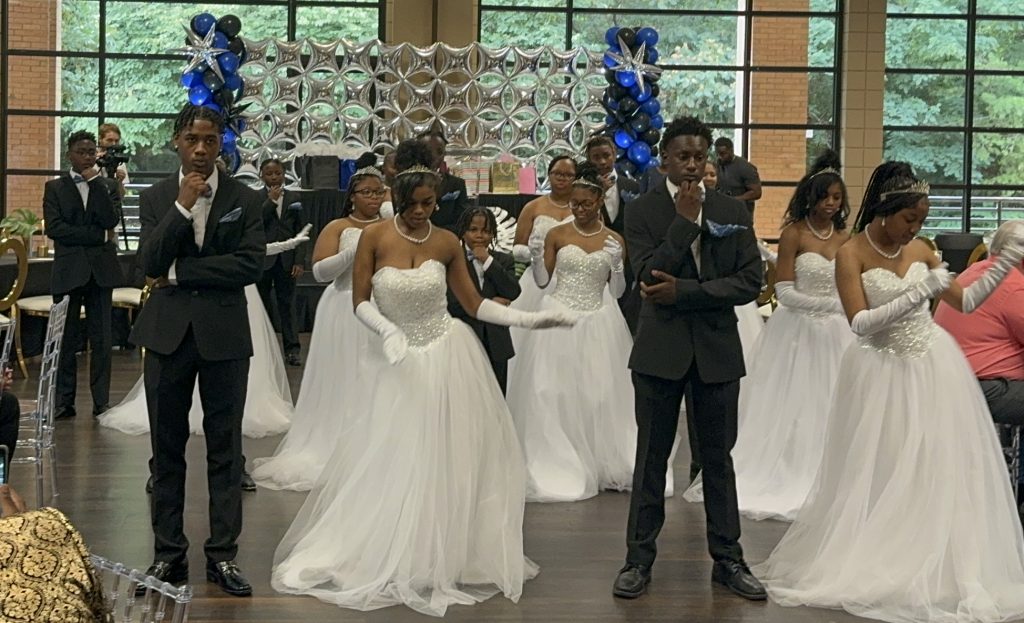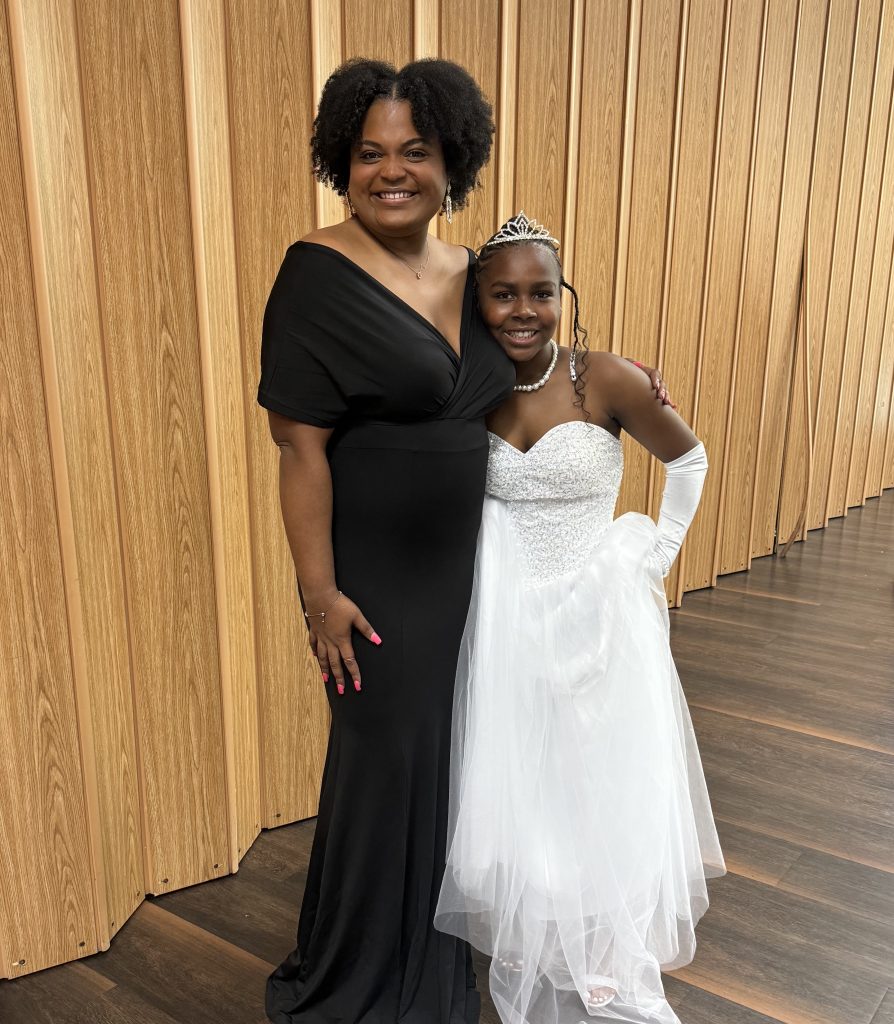
Youths in the Shelby County Relative Caregiver Program in the Center on Developmental Disabilities at UT Health Science Center were dressed in white gowns and black suits at the program’s annual Young Men and Women’s gala featuring music, food, dancing, and a tribute to their relatives who are their caregivers.
During the gala, the youth in the program’s mentoring groups performed a formal waltz learned from a choreographer, spoken word, and honored their caregivers by presenting them with roses and other gifts. The formal attire was provided by the program from its budget and donations.
“A couple of years ago, one young lady said when she puts on the white dress it made her feel so pretty. That’s how we want them to feel,” said Teresa English, program administrator in the Shelby County Relative Caregiver Program. “We want them to know they are beautiful and for the young men to know they are handsome and know the opportunities that are out there for them. Even if they mess up, we’re still here to support them.”
HEROES (Honorable, Exceptional, Respectful, Optimistic, Energizing, Smart), the mentoring group for boys, and GEMS (Girls Empowered and Mentored for Success) for girls, empower and help enhance educational, emotional, and social development through events, motivational speakers, activities, and other opportunities.
“We’ve been having the gala for five or six years. It came to me because we have so many of our children that are not exposed to different things in our culture that we acknowledge that uplifts them. So, when we came up with the idea, they grabbed it,” English said. “It’s an opportunity for us to celebrate our children, to have them dress up and know they are special, and to display a lot of their talents. They don’t have to worry about making sure they have the right attire or anything, because the program takes care of everything. It’s exciting not only for the children but for us as well.”


“They are getting a chance to understand what it means to work in a team setting and build communal skills to achieve a smooth flow of what it means to be in this gala while having fun and making awesome memories,” said Amira Randolph, family advocate counselor, outreach coordinator, and facilitator of the GEMS group. “This gala is definitely a sight of community building for the kids and also community action between staff and the greater Memphis community at large.”
Taderia Twillie, family advocate counselor and facilitator of the HEROES group, said the gala brings a positive light out of the youth. “For some of them, this is the most they will get out of the entire summer. It gives them exposure to different things, such as showing their talent, learning choreography, and building friendships with each other.”
English also said the gala is an opportunity for the program and the caregivers or families to see the children in a different light. “We live in a world where we see a lot of negatives, but on the other end of the spectrum you see many young people that are doing well.”
The GEMS group supports girls ages six to 18 and HEROES supports boys ages eight to 18. Both mentoring groups meet separately once a month and provides respite for relative caregivers.
“Some of the things we have done includes teaching life skills, having men teach them various motivational things on how to be successful in society, and giving them exposure to different things,” Twillie said about the HEROES group activities.

“The GEMS group started back in 2014 by a past staff member, Detris Whitten, with a mission to empower, educate, and inspire middle and high school girls in the program through positive mentoring, life skills, training, and exposure to successful women and people,” Randolph said. “Something we have done in the past few years aside from the gala has been our annual tea party. It is a time for our girls to experience etiquette and all the accoutrements that go with doing a high tea.”
The HEROES and GEMS groups also partner on additional programs throughout the year, covering topics including academic success and anti-bullying.
“We had a wonderful meet-and-greet with the divine nine, they presented their organizations and the colleges they attended to not just our girls but the HEROES as well, and we had a blast,” Randolph said. “We made sure that the kids know that there is an option for them that is oriented toward them; and everyone in the room is encouraging them to achieve that.”
The Shelby County Relative Caregiver Program is the largest and among the oldest programs of its kind in the state. Since it began in 2001, the program has supported more than 9,000 children from 6,500 families, and approximately 95% of these children have not entered foster care.
Offering services and support to individuals who are caring for children of relatives, the program serves to maintain stability in the family and keep children under their family’s care when parents are not able to care for them. In addition to the HEROES and GEMS mentoring groups, the program also includes caregiver support groups, educational workshops, family advocacy, and financial and material assistance. Relative caregivers may also be eligible to receive a monthly stipend by meeting the additional criteria of the stipend program.
Recently, the program was awarded designation as an Exemplary Caregiver Program by the Grandfamilies & Kinship Support Network. The network, funded by the U.S. Department of Health and Human Services’ Administration for Community Living and operated by the nonprofit Generations United, is the first national technical assistance center for government agencies and nonprofit organizations serving grandfamilies and kinship families.
For additional information about the Shelby County Relative Program, located at 239 South Dudley St., contact 901.448.3133 or scrcp@uthsc.edu.
